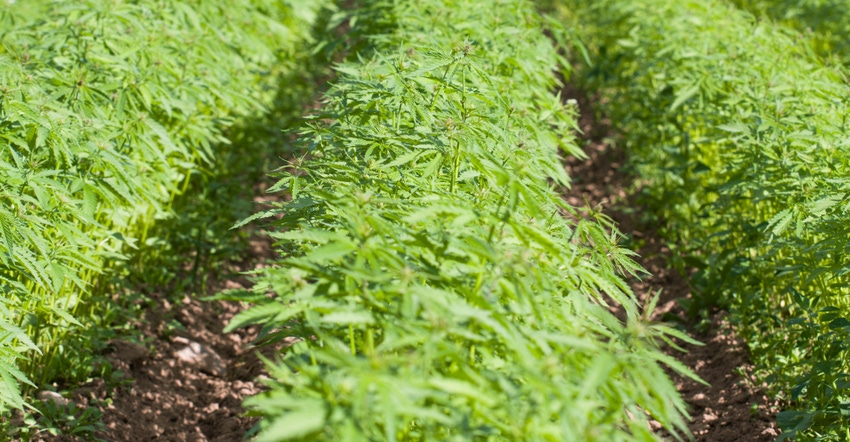California farmers can now join the green rush in 2019, but the state of CBD at retail remains uncertain. Here's why.

In what's being called "a major victory for the hemp industry," Gov. Jerry Brown signed California Senate Bill 1409, which will allow California farmers to enter the rapidly growing hemp industry effective Jan. 1.
California led the cannabis revolution by being the first state to legalize medical marijuana in 1996. It passed recreational marijuana use in 2018, only after Colorado and seven other states led the way.
“Agriculture is a hugely important sector of the California economy," said Eric Steenstra, president of Vote Hemp. "We are thrilled that farmers can now benefit from the economic opportunity of hemp farming.”
SB1409 brings California’s hemp laws up to date by adding pilot program status to California Department of Food and Agriculture’s registration program in conformance with federal requirements and striking outdated state statute provisions that conflicted with the expanded definition of hemp that includes extracts and derivatives from the non-psychoactive flowers and leaves. The bill allows California farmers to grow industrial hemp and to produce hemp oil, fiber, seed and extract.
While the new law makes it legal for California farmers to grow industrial hemp—by definition, cannabis containing less than 0.3 percent THC, the high-inducing cannabinoid. The California Department of Public Health on July 6 issued an FAQ stating that, “Until the FDA rules that industrial hemp-derived CBD oil and CBD products can be used as a food or California makes a determination that they are safe to use for human and animal consumption, CBD products are not an approved food, food ingredient, food additive or dietary supplement.”
So does that mean that California farmers can grow hemp for CBD, but California retail stores cannot sell it and California consumers cannot buy it?
"The California Department of Public Health position makes no sense," Steenstra said. "The bill does not force a change in the position of CDPH, but it does give the industry new arguments as to why the CDPH statement is wrong; and we intend to use it to bring them to the table for discussions."
A coalition of hemp advocates sent the CDPH a July 20 letter explaining how the agency has wrongly interpreted federal legislation around industrial hemp.
"The FAQ cites the United States Food and Drug Administration’s (“FDA”) position on CBD as justification for the Department’s announcement that CBD or other hemp extracts are not an approved food additive to be included in finished products," reads the letter. "The FDA’s position, adopted several years ago, appears to be based, at least in part, on the Drug Enforcement Administration’s (“DEA”) conclusion that CBD is a controlled substance. CBD, however, in and of itself is not scheduled under the Controlled Substances Act (“CSA”). Rather, it is a controlled substance only when it is sourced from 'marihuana,' but not when sourced from lawfully cultivated industrial hemp."
In addition, the 2014 Farm Bill legitimized industrial hemp.
"Accordingly, at the federal level, when CBD is sourced from hemp pursuant to the Farm Bill it is not controlled," concluded the letter.
The hemp coalition has also authored a one-pager for Gavin Newsom, who is expected to be elected the next California governor in November. Brown is term limited.
"He has indicated he will be much more friendly to the industry than Gov. Brown has been," Steenstra said.
The letter advocates California create a state regulation similar to that found in Colorado, where hemp is treated like any other food ingredient. The state applies existing food manufacturing guidelines to products such as hemp oil-infused beverages or hemp-derived CBD supplements. It also allows for the manufacture and distribution of hemp food products for consumer purchase and consumption. It also, notably, prohibits a company with an FDA-approved pharmaceutical from preventing or restricting the production, sale or distribution of naturally occurring CBD extracts.
Being that the FDA just approved a GW Pharmaceuticals CBD drug, Colorado law explicitly states that the pharma firm cannot fiddle with the state's hemp industry.
The Colorado law was seen as model legislation for other states to emulate.
And so while the California law just passed does not immediately change the state of affairs at California retail stores, the writing is on the wall: In November we should see a new California governor who is said to be more hemp-friendly and who could change the status of CBD at retail in the golden state. And in December we should see a Farm Bill passed that makes hemp—and CBD—that much more of a sure thing.
About the Author(s)
You May Also Like




